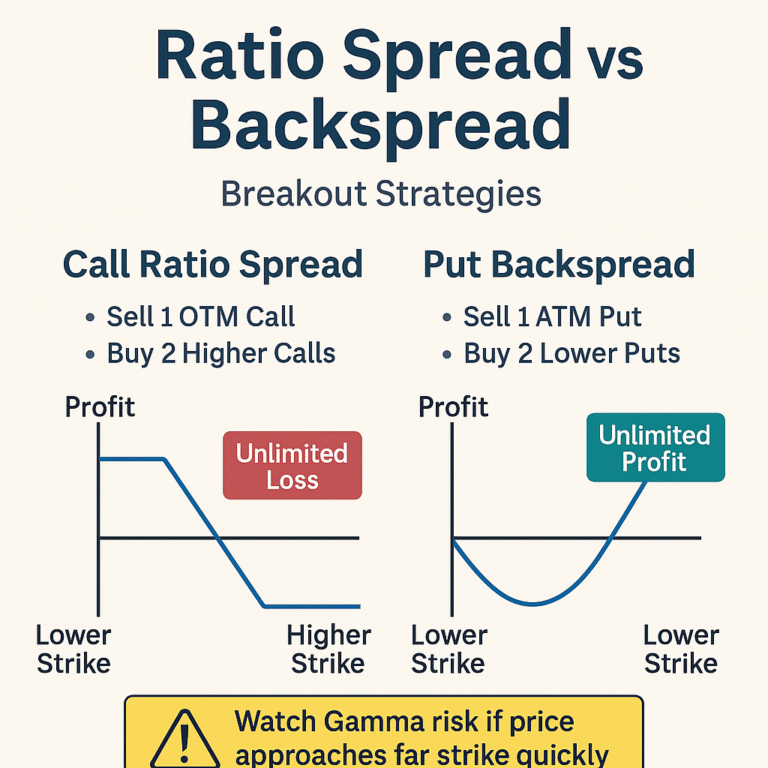🎓 Lesson 15: Ratio Spreads & Backspreads – Tail-Risk Strategies for Volatility Breakouts
📌 Overview
Ratio spreads and backspreads are advanced multi-leg options strategies that involve uneven quantities of contracts, typically selling one option and buying two or more. These strategies are useful when you want low-cost exposure to big directional moves or to hedge against sharp volatility spikes with limited capital.
They allow you to skew your payoff: either reduced cost with capped risk (ratio spread) or defined risk with unlimited upside (backspread).
🧩 Part 1: Ratio Spread
A Ratio Spread involves selling one option and buying more than one of the same type and expiration — often with different strikes.
✅ Example: 1×2 Call Ratio Spread
- Sell 1 OTM Call (e.g., $120)
- Buy 2 higher OTM Calls (e.g., $125)
🧠 Goal: Profit if the stock rises slowly toward the higher strikes — but not too fast.
⚠️ Warning: If the stock blows past the long strikes, you can face unlimited loss.
🧩 Part 2: Backspread (Reverse Ratio)
A Backspread reverses the ratio: buy more options than you sell.
Used when you expect large moves in one direction and want to profit from explosive volatility.
✅ Example: Put Backspread (1×2)
- Sell 1 ATM Put (e.g., $100)
- Buy 2 lower-strike Puts (e.g., $90)
🧠 Goal: Profit if the stock crashes below both strikes.
- Defined risk near breakeven
- Unlimited gain as price collapses
- Can be structured for net credit (ideal) or small debit
📊 Ratio vs Backspread Comparison
| Feature | Ratio Spread (1×2) | Backspread (2×1) |
|---|---|---|
| Directional Bias | Moderate move preferred | Large move expected |
| Capital Efficiency | High | Moderate |
| Max Profit | Limited | Unlimited (with proper setup) |
| Max Loss | Unlimited (if unhedged) | Defined (if net credit setup) |
| Ideal IV Environment | Low → Rising | High → Exploding |
| Use Case | Theta/Delta combo play | Event-driven hedge or lottery |
🧪 Real-World Application
Ticker: IWM (Russell 2000 ETF)
Price: $195
Outlook: High volatility event expected (CPI report)
Strategy: Put Backspread for crash hedge
| Leg | Strike | Action | Premium |
|---|---|---|---|
| Sell 1 Put | $190 | Sell | $5.40 |
| Buy 2 Puts | $180 | Buy | $2.30 x 2 = $4.60 |
| Net Credit | $0.80 |
- Max loss: Between $190–$180 (capped at $9.20 per contract)
- Max gain: Unlimited if IWM drops well below $180
- Breakeven 1: $190 (top of range)
- Breakeven 2: ~$170.80 (profit zone opens below this)
🧠 Strategic Use Cases
| Scenario | Strategy | Reason |
|---|---|---|
| Expecting mild upward drift | Call Ratio Spread | Reduce cost of bullish play |
| Expecting market crash | Put Backspread | Tail-risk hedge with unlimited gain |
| Post-earnings volatility crush | Backspread | Exploit Vega and Gamma spikes |
| SPX/QQQ breakout after consolidation | Call Backspread | Low-cost breakout bet |
⚠️ Risk Management Tips
- Ratio Spreads can become Gamma bombs if underlying breaks through far OTM legs.
- Always monitor Delta and Gamma daily on short legs.
- Prefer setting up Backspreads for net credit — that way you profit even if the move doesn’t come.
- Roll or hedge ratio spreads if the underlying moves too fast.
Learn more about risk management at Investopedia
🖼️ Infographic Suggestion
Title: “Ratio Spread vs Backspread – Breakout Strategies”
Include:
- Side-by-side P/L chart
- Highlight danger zone of Ratio Spread
- Highlight unlimited gain zone of Backspread
- Gamma risk warning overlay
🧠 Pro Trader Wisdom
“Ratio spreads give you premium with a catch. Backspreads give you unlimited payout — only if the market screams. Use them sparingly, hedge them wisely, and never sleep on Gamma exposure.”
Feel free to check out our Stock Options Analysis & Trading Strategies for a deeper understanding & real world applicability!

